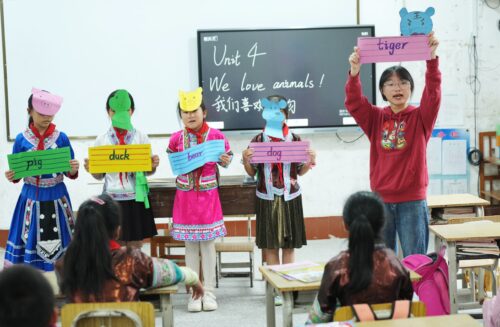With Confucius Institutes dwindling in the U.S., what’s next for Chinese language education?
"Confucius Institute has become a convenient target under the current tensions between China and the U.S. And the students suffer."

As the fall academic year approaches, many universities are again seeing a wave of closures of Confucius Institutes (CIs), the controversial Chinese government-funded institutions that have been accused of being a propaganda arm for the Chinese Communist Party (CCP).
According to the National Association of Scholars (NAS), a conservative group that has advocated for the closure of CIs, only around 30 will remain in the United States by the end of 2021, down from 110 in 44 states in 2017. This year’s closures come as national opinion of China has reached an all time low — 67 percent of Americans have “cold feelings” toward China — and as reports of anti-Asian violence have skyrocketed across the U.S.
At the same time, interest in learning languages at the college level has declined, and the liberal arts, which were already facing funding cuts across the country, are facing greater challenges amid the pandemic.
The combination of worsening geopolitical relationships, the decline in national opinion about China, and fewer opportunities for intercultural exchange has created a “perfect storm,” says Jamie Horsley, a fellow at the Brookings Institute and Yale Law School, “that would dampen a healthy interest in understanding more about this huge and really incredible country that we have to deal with.”
Some universities have seen the end of their CIs as a major loss. And while some well-funded private schools or large public institutions have filled the gap left behind by CIs, it’s the smaller and lesser-funded schools that are taking the hit, Horsley says.
“CI has become a convenient target under the current tensions between China and the U.S. And the students suffer,” says Yige Wang, former director of the University of New Hampshire’s CI. The institute had employed two Chinese teachers — in addition to a full-time faculty member employed by UNH — before the announcement of its closure this summer due to “amplified concerns in Washington about security and influence” and “the real possibility of losing significant federal research funding,” according to University President James Dean.
The closure has also caused disruptions at local public schools, which hosted Chinese teachers through the Confucius Classrooms program. Some of these schools have not been able to come up with the funding to replace lost teachers, according to Wang.
UNH has said that it’s working to maintain a relationship with its former partner through CI, Chengdu University, and will continue to offer the same Chinese courses. But with only one faculty member and a still-vacant adjunct position, faculty in the Chinese program say it is facing a challenge maintaining basic course offerings previously supported by the CI, which gave UNH approximately $138,000 in financial support per year.
“They’re not going to be able to have as many courses or go abroad to Chengdu,” Wang says. “So that’s why we hope to keep the relationship with [Chengdu] over the years.”
Why are more CIs closing now?
Confucius Institutes have been controversial for years, with concerns repeatedly raised that institutes funded by a foreign power pose a threat to security and academic integrity while serving as a CCP propaganda arm. Critics say CIs censor sensitive topics like Taiwan, Tibet, Tiananmen Square, and Xinjiang, and has discriminated against teachers with a history of involvement in the Falun Gong. Despite fears that CIs serve as outposts to recruit spies and facilitate espionage, numerous investigations have been unable to find any evidence to support these claims.
In response to criticisms, CIs rebranded in 2020, renaming its parent organization from Hanban to the Ministry of Education Center for Language Education and Cooperation in order to highlight the “language exchange” component of the initiative. But that hasn’t done much to dispel the perception, among many Americans, that CIs transmit Chinese propaganda. During the Trump administration, the speed of CI closures escalated under mounting pressure from the federal government: provisions in the 2019 National Defense Authorization Act (NDAA) forced schools to choose between their CI and foreign language program funding from the defense department. Last summer, former Secretary of State Mike Pompeo announced that the Confucius Institute U.S. Center (CIUS) would be designated as an official Chinese government entity. A recent bill that would add further limitations and oversight requirements to CIs passed the Senate this spring.
Many of this year’s CI closures come as a result of the 2021 NDAA renewal, this time stipulating that universities would risk losing all federal higher education funding unless universities maintained “full operational control” over CI activities. Despite the fact that some, like UNH, already had oversight boards that independently approved curricula and activities annually, and oversaw the hiring of teachers, “there was too much at stake” to risk losing DoD funds, Wang says.
“The recently passed National Defense Authorization Act contains specific language that no Department of Defense funding can go to any university that hosts a Confucius Institute,” Kathleen Fairfax, Vice Provost of International Affairs at Colorado State University, told NAS. “CSU does millions of dollars of joint projects with the DoD, so that pretty much made the decision to close the CI inevitable.”
Horsley says falling interest in learning Chinese nationally has also contributed to the decline of support of CIs; the reason for the University of Southern Maine’s CI closure this year was that it “wasn’t reaching enough students,” according to a spokesperson there.
What comes next?
The government still offers some support to students interested in studying what it considers critical languages, like the Language Flagship program, but “a lot of the funding for these sort of area studies centers, like centers for Chinese studies, too appears to have dried up,” Horsley says. She adds that instead of forcing “cash-strapped universities to choose between federal funding and properly managed CI programs,” the U.S. government should rethink its policy on CIs and invest more federal funds on language learning. Meanwhile, critics have called for an all-out elimination of CIs, and appear to be winning, with only 32 institutes remaining at American colleges and universities.
Amid all this, Taiwan sees a window of opportunity. At the end of 2020, Director of the American Institute of Taiwan Brent Christensen announced the U.S.-Taiwan Education Initiative, whose stated goal is to expand “access to Chinese and English language instruction, while safeguarding academic and intellectual freedom” through the increased exchange of Chinese and English teachers between Taiwan and the U.S.
“Interest in Chinese language learning remains strong among American and international students,” Christensen said in a speech in December. “Taiwan can and should play a key role in addressing that interest.”
To do that, says American Institute in Taiwan spokesperson Ed Dunn, Taiwan’s Ministry of Education and Ministry of Foreign Affairs are investing more funds into expanding existing programs like Fulbright and Huayu.
“This is a great opportunity for Taiwan, not only to teach Mandarin and learn English, but to more fully tell Taiwan’s story,” Dunn said in a statement.
Taiwan also benefited after the Trump administration ended the U.S.-China Fulbright exchange last year in response to China’s imposition of the Hong Kong national security law. Over 30 people who had planned to conduct research at Chinese universities transferred their scholarships to Taiwan.






